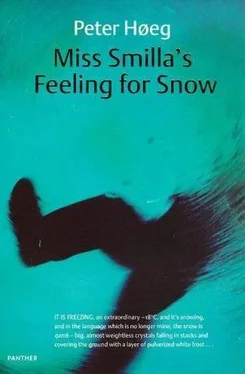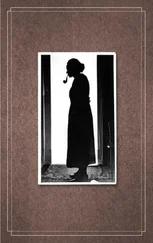Peter Høeg - Smilla's Sense of Snow aka Miss Smilla's Feeling for Snow
Здесь есть возможность читать онлайн «Peter Høeg - Smilla's Sense of Snow aka Miss Smilla's Feeling for Snow» весь текст электронной книги совершенно бесплатно (целиком полную версию без сокращений). В некоторых случаях можно слушать аудио, скачать через торрент в формате fb2 и присутствует краткое содержание. Жанр: Современная проза, на английском языке. Описание произведения, (предисловие) а так же отзывы посетителей доступны на портале библиотеки ЛибКат.
- Название:Smilla's Sense of Snow aka Miss Smilla's Feeling for Snow
- Автор:
- Жанр:
- Год:неизвестен
- ISBN:нет данных
- Рейтинг книги:3 / 5. Голосов: 1
-
Избранное:Добавить в избранное
- Отзывы:
-
Ваша оценка:
- 60
- 1
- 2
- 3
- 4
- 5
Smilla's Sense of Snow aka Miss Smilla's Feeling for Snow: краткое содержание, описание и аннотация
Предлагаем к чтению аннотацию, описание, краткое содержание или предисловие (зависит от того, что написал сам автор книги «Smilla's Sense of Snow aka Miss Smilla's Feeling for Snow»). Если вы не нашли необходимую информацию о книге — напишите в комментариях, мы постараемся отыскать её.
Smilla's Sense of Snow aka Miss Smilla's Feeling for Snow — читать онлайн бесплатно полную книгу (весь текст) целиком
Ниже представлен текст книги, разбитый по страницам. Система сохранения места последней прочитанной страницы, позволяет с удобством читать онлайн бесплатно книгу «Smilla's Sense of Snow aka Miss Smilla's Feeling for Snow», без необходимости каждый раз заново искать на чём Вы остановились. Поставьте закладку, и сможете в любой момент перейти на страницу, на которой закончили чтение.
Интервал:
Закладка:
I wonder whether diesel oil burns. I seem to remember that it depends on the temperature. At that instant the diesel tank blows up.
There isn't any explosion, it's more like a whistle that turns into a roar, that grows and turns into the shrillest sound that ever existed on earth. I press my head against the floor. When I look up, the bed is gone. The wall to the engine room is gone, and I'm looking into a world of fire. In the middle of this world the engine is a black rectangle with a tooled network of pipes. Then it starts to sink. It breaks away from the ship. When it reaches the sea, it causes explosive boiling. Then it vanishes. Over the water tongues of burning diesel fuel weave a tapestry of flames.
The stern of the boat now forms an open gateway facing Iceland Wharf. As I stand there looking out, the whole ship slowly turns, away from the burning oil.
The wreck starts to list. The water has made its way into the hull and is pulling it backward. I'm standing in water up to my knees.
The door behind me bangs open, and the professor comes in. The careening of the ship has made his office chair roll. He slams into the bulkhead next to me. Then he rides through what once was his bedroom and plunges into the water.
I take off my clothes. The suede coat, sweater, shoes, pants, shirt, panties, and finally my socks. I put my fingers to my hat. I have only a circle of fur on my head. The spurt of flames from the diesel engine must have burned it away. I feel blood on my hands. The top of my skull has been singed bald.
It's maybe two hundred yards to the dock at Svajer Wharf. I have no choice. On the other side is the fire. I jump.
The shock of the cold forces me to open my eyes while I'm still underwater. Everything is gleaming green and red, lit up by the fire. I don't look back. In water less than 42°F you can survive only for a few minutes. The number of minutes depends on your condition. Swimmers of the English Channel were in good shape. They could last a long time. I'm in very poor shape.
I swim almost vertically, so that only my lips are above water. The problem is with the weight of the part of your body that's above water. After a few seconds the shaking starts. While your body temperature drops from 98.6° to 95°F you shake. Then the shaking stops. That's when your temperature falls to 86°F. This temperature is critical. That's when apathy sets in. That's when you freeze to death.
After a hundred yards I can't straighten out my arms anymore. I think about my past. That doesn't help. I think about Isaiah. That doesn't help. I suddenly feel as if I'm not swimming anymore but standing on a slope and leaning into a stiff wind, and that I might just as well give up.
Around me the water is a mosaic of bits of gold. I remember that someone has tried to kill me. And that they're now standing somewhere and congratulating themselves. We got her. Smilla. The fake Greenlander.
That thought carries me over the last stretch. I decide to take ten more strokes. At the eighth one I bang my head against a tractor tire hung as a bumper on the berth of the Northern Light.
I know that I have only a few seconds of consciousness left. Next to the tire is a platform right over the water. I try to scream myself up onto it. Not a sound comes out. But I manage to pull myself up.
If you fall into the water in Greenland, you run when you get out, to keep from freezing. But there the air is cold. Here it's wonderfully mild, like in the summer. At first I don't understand why. Then I realize it's because of the fire. I lie there on the platform. The Northern Light is now in the middle of the harbor entrance, a coal-black skeleton of wood in a white ball of fire.
I crawl up the stairs on my hands and knees. The dock is deserted. There's not a soul around.
I'm about to collapse, basking in the warmth of the burning ship. I can see my own naked skin glowing. The little hairs, singed black and curling. Then I start walking. I have hallucinations, fragmentary, incoherent. From when I was little. A flower I found, knotweed, with buds. A convulsive fretting about whether Eberlein has more brocade like the kind my hat was made of. The feeling of being sick and wetting my bed.
There are headlights, and I don't care. The car stops, and it doesn't make any difference. Something is wrapped around me. Nothing could interest me less. I lie down. I recognize the holes in the roof. It's the little Morris. It's the back of the mechanic's neck. He's driving the car. "Smilla," he says. "Smilla, damn it…"
"Shut up," I say.
In his apartment he wraps me up in wool blankets and massages me until it hurts too much. Then he makes me drink one cup of milk tea after another. The cold won't go away. It feels as if it has penetrated my whole skeleton. At some point I also accept a glass of liquor.
I cry a lot. Partly out of self-pity. I tell him about Isaiah's hiding place. About the cassette tape. About the professor. About the phone call. About the fire. I feel as if my mouth is going while I stand somewhere else looking on.
He doesn't comment.
At some point he fills the bathtub with water for me. I fall asleep in the tub. He wakes me up. We lie side by side in his bed and sleep. A few hours at a time. I don't really feel warm until it starts to get light.
It's morning when we make love. I guess I'm not quite myself.
Part Three
The City
1
I change cabs twice and get out at Farum Road. From there I take the path through Utterslev Marsh, and I look back 250 times.
I call from Tuborg Road. "What is Neocatastrophism?"
"Why do you always call from those insufferable phone booths, Smilla? Is it money? Have they disconnected your phone? Shall I get it hooked up again?"
For Moritz, a New Year's Eve party is the king of all parties. He suffers from a cyclical, recurrent delusion that it's actually possible to start afresh, that you can build a new life on resolutions. On New Year's Day the pounding in his head is so bad that it's audible over the phone. Even a pay phone.
"There was a conference on the topic in Copenhagen, in March of '92," I say.
He stifles a groan as he tries to make his brain function. What finally gets it going is the fact that my question turns out to have something to do with him.
"I was invited," he says.
"Why didn't you go?"
"There was too much to read."
He has been saying for years that he has given up reading. First of all, it's a lie. Second, it's an insufferable way of intimating that he has grown so smart that the rest of the world has nothing more to teach him. "Neocatastrophism is a collective term. It was coined by Schindewolf sometime in the sixties. He was a paleontologist. But all kinds of scholars in the natural sciences have taken part in the debate. What they agree on is that the earth-and, in particular, its biology-has not evolved at an even pace but in leaps, which have been directed by great natural catastrophes that favor the survival of specific species. Meteor showers, comets, volcanic eruptions, spontaneous chemical disasters. The core of the debate has always been the question of whether these catastrophes occur at regular intervals. And if they do, what determines the frequency? An international association was established. Their first meeting was in Copenhagen. At the Falkoner Conference Center. Opened by the Queen. They spared no expense. They get money from left and right. The unions contribute because they think it's research about environmental disasters. Those in the industrial sector contribute because they think that at least it's not about environmental disasters. The research councils contribute because the association has some big names to flaunt."
"Does the name Hviid mean anything in that connection? Tørk Hviid?"
Читать дальшеИнтервал:
Закладка:
Похожие книги на «Smilla's Sense of Snow aka Miss Smilla's Feeling for Snow»
Представляем Вашему вниманию похожие книги на «Smilla's Sense of Snow aka Miss Smilla's Feeling for Snow» списком для выбора. Мы отобрали схожую по названию и смыслу литературу в надежде предоставить читателям больше вариантов отыскать новые, интересные, ещё непрочитанные произведения.
Обсуждение, отзывы о книге «Smilla's Sense of Snow aka Miss Smilla's Feeling for Snow» и просто собственные мнения читателей. Оставьте ваши комментарии, напишите, что Вы думаете о произведении, его смысле или главных героях. Укажите что конкретно понравилось, а что нет, и почему Вы так считаете.




![Рута Шепетис - Ashes in the Snow [aka Between Shades of Gray]](/books/414915/ruta-shepetis-ashes-in-the-snow-aka-between-shades-thumb.webp)







